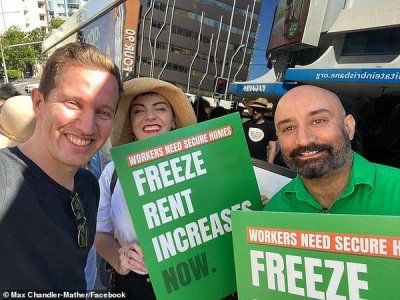The Greens' Rent Freeze Plan: How it could impact you
There's always something happening in the world of politics, and it's essential to stay informed about policy changes that affect our lives.
Recently, the Greens have been pushing for a rent freeze plan. They refuse to pass Labor's $10 billion Housing Australia Future Fund, which aims to construct 30,000 new social housing units unless rents are frozen for two years.
The question is, what are the consequences of such a policy?

It's important to note that the Australian Constitution prevents the federal government from regulating rents, leaving such policies to the states and territories.
In 2019, the Australian Capital Territory (ACT) introduced tighter restrictions on what landlords could charge tenants, creating a stir among property investors worried the policy would discourage their investments.
Although the ACT has not adopted a rent freeze, landlords can only raise rents by up to 10 per cent above inflation.
For example, if the consumer price index (CPI) is 6.8 per cent, landlords can charge a maximum increase of 7.48 per cent (6.8% + 0.68%) when renewing leases.
Federal Housing Minister Julie Collins asserts that rent cap policies similar to the ACT's have reduced the housing supply in the region, leading to higher rents in the long run.
After all, scarcity often drives up prices.
'The overwhelming evidence suggests that it doesn't work.' Collins revealed on ABC Insiders, adding that experts have documented decreased housing supply by up to 15 per cent and reduced stock quality when rent caps are introduced.

Interestingly, the ACT has experienced the smallest rent increases of any capital city market. Nonetheless, ACT unit rent costs increased by 1.5 per cent while Sydney apartment rents skyrocketed by 19.3 per cent.
The Greens are now urging a national rent freeze for two years, with subsequent rent increases limited to two per cent every two years. However, critics argue that state-based policies reduce rental supply, ultimately hurting the market and tenants alike.
Across Australia, rental vacancy rates have reached near-record lows. For example, Sydney's vacancy rate sits at 1.5 per cent, while Adelaide's stands at 0.5 per cent, reflecting a rental market under significant pressure.
Dr Peter Swan, Professor at the University of New South Wales Business School, warned that policies like the Greens' rent freeze could create a black market.
As the supply of rental stock dwindles, existing tenants may be forced to pay even more.
Furthermore, a rental cap may lead landlords to sell their properties, resulting in evicted tenants searching for scarce rental accommodation.
Considering alternative solutions to the housing crisis and rising rents that might not have such adverse side effects is crucial.
For instance, incentivising property developers to produce affordable housing units, implementing tax breaks or subsidies for landlords who offer reasonable rents, or increasing the supply of public housing options could be potential avenues to explore.
At present, it remains uncertain how the Greens' rent freeze plan would play out if implemented across the country. However, understanding the potential consequences, as shaped by the ACT's experiment with rent control, is crucial for all of us.

Remember, knowledge is power, and staying informed is essential for making the best decisions for ourselves and our families.
Members, what are your thoughts on the proposed rent freeze plan? Are there alternative approaches you think could address the housing crisis and rising rents without the adverse side effects of rent caps? Share your insights and opinions on this topic.
Recently, the Greens have been pushing for a rent freeze plan. They refuse to pass Labor's $10 billion Housing Australia Future Fund, which aims to construct 30,000 new social housing units unless rents are frozen for two years.
The question is, what are the consequences of such a policy?

The Greens are standing firm in their refusal to support Labor's $10 billion Housing Australia Future Fund, a plan aimed at constructing 30,000 new social housing units. The Greens' condition for their support is the implementation of a rent freeze. In the accompanying image, Greens housing spokesman Max Chandler-Mather is pictured on the left, alongside state Greens MP Amy McMahon in the centre. Source: Max Chandler-Mather/Facebook
It's important to note that the Australian Constitution prevents the federal government from regulating rents, leaving such policies to the states and territories.
In 2019, the Australian Capital Territory (ACT) introduced tighter restrictions on what landlords could charge tenants, creating a stir among property investors worried the policy would discourage their investments.
Although the ACT has not adopted a rent freeze, landlords can only raise rents by up to 10 per cent above inflation.
For example, if the consumer price index (CPI) is 6.8 per cent, landlords can charge a maximum increase of 7.48 per cent (6.8% + 0.68%) when renewing leases.
Federal Housing Minister Julie Collins asserts that rent cap policies similar to the ACT's have reduced the housing supply in the region, leading to higher rents in the long run.
After all, scarcity often drives up prices.
'The overwhelming evidence suggests that it doesn't work.' Collins revealed on ABC Insiders, adding that experts have documented decreased housing supply by up to 15 per cent and reduced stock quality when rent caps are introduced.

According to Julie Collins, the federal Housing Minister for Labor, rent caps have been proven to negatively impact the housing supply in the only region of Australia where such measures have been implemented. Image by Ketut Subiyanto
Interestingly, the ACT has experienced the smallest rent increases of any capital city market. Nonetheless, ACT unit rent costs increased by 1.5 per cent while Sydney apartment rents skyrocketed by 19.3 per cent.
The Greens are now urging a national rent freeze for two years, with subsequent rent increases limited to two per cent every two years. However, critics argue that state-based policies reduce rental supply, ultimately hurting the market and tenants alike.
Across Australia, rental vacancy rates have reached near-record lows. For example, Sydney's vacancy rate sits at 1.5 per cent, while Adelaide's stands at 0.5 per cent, reflecting a rental market under significant pressure.
Dr Peter Swan, Professor at the University of New South Wales Business School, warned that policies like the Greens' rent freeze could create a black market.
As the supply of rental stock dwindles, existing tenants may be forced to pay even more.
Furthermore, a rental cap may lead landlords to sell their properties, resulting in evicted tenants searching for scarce rental accommodation.
Considering alternative solutions to the housing crisis and rising rents that might not have such adverse side effects is crucial.
For instance, incentivising property developers to produce affordable housing units, implementing tax breaks or subsidies for landlords who offer reasonable rents, or increasing the supply of public housing options could be potential avenues to explore.
At present, it remains uncertain how the Greens' rent freeze plan would play out if implemented across the country. However, understanding the potential consequences, as shaped by the ACT's experiment with rent control, is crucial for all of us.
Key Takeaways
- The Greens are demanding a rent freeze for two years and future rent increases capped at two per cent every two years, refusing to pass Labor's $10 billion Housing Australia Future Fund.
- Federal Housing Minister Julie Collins opposes rent caps, citing that they would hurt supply and cause tenants to pay more, which happened when the Australian Capital Territory (ACT) more tightly capped landlords' charges in 2019.
- Critics argue that the ACT's tighter rent cap has led to landlords selling and reducing the supply of available rental accommodation.
- While the Constitution prevents the federal government from freezing or capping rents, states and territories have the power to do so.
Remember, knowledge is power, and staying informed is essential for making the best decisions for ourselves and our families.
Members, what are your thoughts on the proposed rent freeze plan? Are there alternative approaches you think could address the housing crisis and rising rents without the adverse side effects of rent caps? Share your insights and opinions on this topic.








